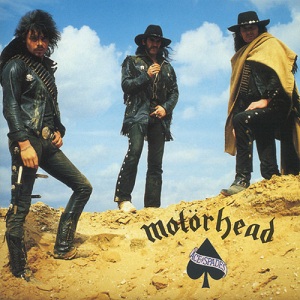
[Lemmy passed away yesterday. RIP, you badass!] As we watch what may soon be the end of Motörhead, with a fine new album just out but iconic leader Lemmy's failing health forcing him from the stage on multiple nights, let's also look back at a milestone in the group's long career.
Bassist/singer Lemmy Kilmister started Motörhead in 1975 after getting kicked out of prog-rockers Hawkwind for being jailed on a drug charge in Canada during a tour. The band's early days were not marked by success. After being signed by United Artists, Motörhead's first shot at recording an album was rejected, and the label then blocked the group's attempted release of a single on Stiff. In '77 -- the lineup having completely turned over aside from its frontman -- they were ready to throw in the towel and even scheduled a farewell concert, but then Chiswick Records gave them money to record a single and by working quickly (and with a little more support from Chiswick) they turned that session into their debut album. After that things got better, but the band had yet to break through as of 1980.
On August 4, 1980, producer Vic Maile took Motörhead into Jackson's Studios in Rickmansworth to start work on what would be the band's fourth album. Maile was a veteran behind-the-scenes presence on the English rock scene: engineer (and sometimes producer) for the Kinks (Arthur), Hawkwind (including the classic concert album Space Ritual), Dr. Feelgood, Eddie & the Hot Rods, Nick Lowe (Jesus of Cool AKA Pure Pop for Now People), and many more. By September 15, they had finished one of the greatest rock 'n' roll albums ever made. (The press has categorized Motörhead, not unjustly, as a metal band, but Lemmy, born in 1945, has always called what Motörhead does simply "rock 'n' roll." The band's gleeful political incorrectness, powerhouse sound, rapid tempos, and brevity earned it fellow traveler status in many eyes.)
Ace of Spades appeared quickly, the title track being released as a single on October 27 and the LP coming out on November 8. Things began looking up for the band immediately, with an incongruous but profile-raising appearance on Top of the Pops later that month.
Ace of Spades was a smash hit in England, reaching No. 5 on the LP chart (the band's best showing ever with a studio album -- in 1981, the live album No Sleep 'til Hammersmith -- also produced by Maile -- hit No. 4) and became their first LP also issued by an American label, while its title track made it to No. 15 on the singles chart. The latter remains Motörhead's best showing on the singles chart under its own name, though it's worth noting that the three-song EP St. Valentine's Massacre shared with Girlschool, which found them combining forces as Headgirl on a smokin' cover of the 1959 Johnny Kidd & the Pirates song "Please Don't Touch," surprisingly made it all the way to No. 5 on the singles chart; it included Motörhead's cover of the Girlschool song "Emergency."
Both these songs are bonus tracks on the most recent CD version of Ace of Spades, as is the flipside of "Ace of Spades," "Dirty Love." (Girlschool's cover of Motörhead's "Bomber," the third track on that EP, isn't included.) Though "Dirty Love" in particular is another killer track, the original LP's dozen songs remain the main attraction. Motörhead's hard, fast, dirty sound was a reaction against what Lemmy called the "geezer plodding" of the heavy metal of the time. "Ace of Spades" leads off the album, using the metaphors of gambling and the title card's symbolism of death to explain the band's willingness to live on the edge. The Wild West metaphor "Shoot You in the Back," the "Born to Lose" answer song "Live to Win," and the scorching "The Hammer" are in similar veins. "Love Me Like a Reptile," "Fast and Loose," "Fire, Fire," and "Jailbait" all depict the band's fast and loose attitude towards women on the road, while "The Chase Is Better Than the Catch" is more philosophical about it. The cynical breakup song "Bite the Bullet" is the only reference to a relationship longer than a night; more love's reserved for music, on "Dance," and Motörhead's partners in crime, on "(We Are) The Road Crew."
It almost doesn't matter what Lemmy's growling and rasping about, because it's the music's brutal relentlessness that's the main point. This is a classic power trio, and its nearly non-stop touring had made Lemmy, guitarist Fast Eddie Clarke, and drummer Phil "Philthy Animal" Taylor a tight, no-mercy unit. This is the classic Motörhead lineup, which would be completely changed aside from Lemmy by 1983; it doesn't get any better than Ace of Spades and No Sleep 'til Hammersmith.
